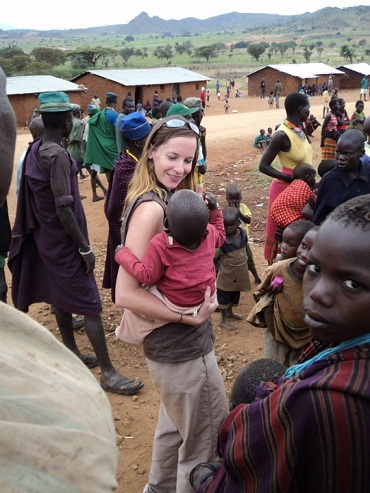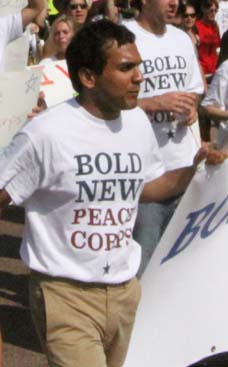
"The children in Northern Uganda don't outwardly appear to be suffering. They are active, smiling, laughing children. Still, when you look closer and come to learn the subtle symptoms of malnutrition, you'll see it exists in quite a majority. Their hair may have fuzzy brown patches, the bellies are distended, they are too small for their age. My three-month internship landed during a fortunate time in the Karamoja region, with the rain and therefore crops being quite plentiful. I've been told this is the greenest they've seen it here in four years. The crops provide mostly carbohydrates however. Due to unpredictable weather patterns, flooding, drought, the climate makes it difficult to grow a variety of foods, so people aren't getting the micronutrients and vitamins every human needs."
RPCV Stacey Rice works with Mercy Corps in Uganda
Interview: Stacey Rice of Mercy Corps in Uganda
Part of: Ending World Hunger
Author: William Lambers - Published:
Oct 22, 2010 at 12:46 pm 1 comment
Stacey Rice has an amazing job with NASA as a biomedical engineer taking care of the health of astronauts. But at this very moment, she is living "a dream come true" on an internship with Mercy Corps in Uganda.
Stacey specializes in nutrition, and she is using her talents to help children in the Karamoja region of the country. In the following interview, she shares some of her experiences in Uganda as well as ideas for improving child nutrition.
What have you observed about the condition of children in Northern Uganda?
The children in Northern Uganda don't outwardly appear to be suffering. They are active, smiling, laughing children. Still, when you look closer and come to learn the subtle symptoms of malnutrition, you'll see it exists in quite a majority. Their hair may have fuzzy brown patches, the bellies are distended, they are too small for their age. My three-month internship landed during a fortunate time in the Karamoja region, with the rain and therefore crops being quite plentiful. I've been told this is the greenest they've seen it here in four years. The crops provide mostly carbohydrates however. Due to unpredictable weather patterns, flooding, drought, the climate makes it difficult to grow a variety of foods, so people aren't getting the micronutrients and vitamins every human needs.
Are there enough supplies, such as Plumpy'Nut, to deal with cases of severe to moderate malnutrition in children in Northern Uganda?
Doctors Without Borders and Action Against Hunger are both working with the Ministry of Health (MoH) to provide Plumpy'Nut in the clinics as well as milk, so for now, supply is okay. I've asked clinic workers however, if they think MoH can continue to manage the malnourishment program once these organizations have left. They are doubtful.
During your visit, what has come to mind in terms of ways of improving child nutrition? What short-term and long-term solutions come to mind?
Education!!!! Caretakers, specifically mothers, need to be taught how to feed their children a variety of foods and understand the importance of breastfeeding until the child is at least two years old. Pregnant and lactating women also need to learn how to take care of themselves, as the nutrients they ingest are passed on to their infants. Mothers leave their children all day to work in the fields. Babies may only be breastfed two or three times a day, where ten to twelve times is recommended. They also introduce foods into a child's diet too young, and the wrong types of foods. We are encouraging exclusive breastfeeding until six months.
Alcoholism is another large factor that needs to be addressed. The local brew is called "queta," an alcohol made from sorghum. Queta is plentiful and inexpensive, and commonly serves as breakfast, lunch and dinner. Even children are fed the alcohol. Just this morning my coworker told me she overheard her neighbors arguing last night. One woman had been drinking all day and then went to breastfeed her child. But, at any rate, I'm glad to hear that someone in that household was knowledgeable and willing to address the issue.
The illiteracy rate here is around 90%. The value of education is not understood. Children are sent to school solely for the school lunches provided by the World Food Programme. What I've seen is that they go to school just before lunch and leave right after. Livestock is livelihood, and a child who can tend to the cattle and sheep is more valued than an educated one. But then again, we have some very intelligent and impressive local staff here at Mercy Corps. I asked them why they stood apart. They explained that their parents and grandparents went to school and believed in their education. It takes generations to change cultural mindsets.
Through Mercy Corps' USAID-funded Multi-year Assistance Program (MYAP), we are entering qualified young children and mothers into the Supplementary Food Program where they will receive rations for three months and monitor their progress. But only providing food is not a sustainable solution, so another component of the MYAP program is to provide education. Among other interventions, we are arranging and training Mother Care Groups, women well respected within their respective villages who are motivated and willing to share healthy messages with their community.
Some regions in Karamoja are able to produce various plentiful crops, but the insecurity of the area is a factor in the willingness to tend to their farms or bring the crops to market. Aside from the insecurity, they may not know the best practices for good harvest. Achieving optimal health takes a multidisciplinary approach. That is why Mercy Corps' Health Program works in coordination with Agriculture, Livelihoods, and Peace-Building programs.
How can the international community become engaged to implement such solutions? How can someone reading this now take action?
Show your passion! You have a voice, use it! Visit www.actioncenter.org where you can sign the Root Out Hunger petition.
You've heard it before, but humanitarian organizations can always use volunteers. Maybe you think you don't have the time, or even the courage, to volunteer – but it will change your life in ways you can't imagine – even just an hour a week at your local soup kitchen. Visit www.mercycorps.org for more ways to take action and contribute.
Is there a particular story or event that stands out from your mission? Is there a particular person or family in Northern Uganda that you would like to tell us about?
That's actually a very hard question to answer, because everyone I meet touches my heart, from the grandmother living in the internally displaced persons camp with nowhere to go, to the amazing people I share my office with. Mercy Corps has an employee who was abducted by the Lord's Resistance Army back in 2002. He was badly beaten and lives with severe back pain. He had surgery in Uganda which left him paralyzed but he has trained himself to walk again. Ugandans are so resilient. This article would turn into a book if I explained all the nightmares they have survived…and despite that, they are the most generous and joyful people on the planet. They inspire me to be better and forget my petty troubles. My internship comes to an end in one week. I will never forget Uganda's faces and stories. I hope to return someday, to be able to give back all that Uganda has given me.













